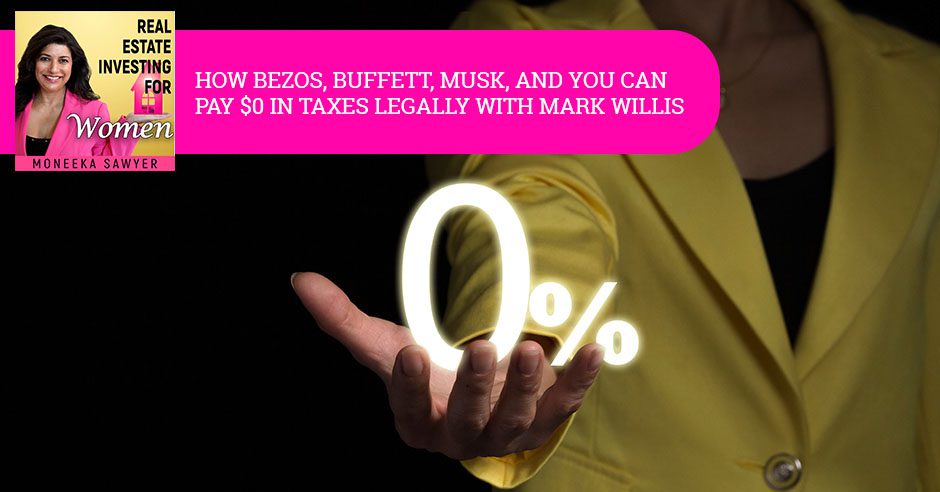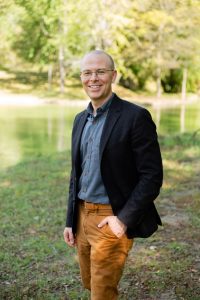How Bezos, Buffett, Musk, And YOU Can Pay $0 In Taxes Legally With Mark Willis – Real Estate For Women

Taxes take a lot from you – your finances, your time, and your energy. What if you’re told you can legally pay zero in taxes today? Believe it or not, there are ways you can enjoy retirement freely without worrying about the IRS. Mark Willis is a man on a mission to help you think differently about your money, your economy, and your future. Mark is a certified financial planner, a three-time number one bestselling author, and the owner of Lake Growth Financial Services. Mark joins Moneeka Sawyer to talk about how you can grow wealth in ways that are safe so you can enjoy tax-free income in retirement. Listen in as Mark shares how you can become your own source of financing so you can have financial control over your future.
—
Watch the episode here
Listen to the podcast here
How Bezos, Buffett, Musk, And YOU Can Pay $0 In Taxes Legally With Mark Willis – Real Estate For Women
Real Estate Investing For Women
I am so excited to welcome back Mark Willis to the show. You’ve heard from Mark several times on this show. We’ve even had webinars with him. He’s shot me an email and said, “I’ve got this new strategy. It’s called BBD.” I’m not going to tell you what that is. I’m so excited to share this strategy with you and include you in this conversation.
Before we move forward with BBD, let me reintroduce Mark to those of you who have not met him yet. Mark Willis, CFP, is a man on a mission to help you think differently about your money, your economy and your future. Mark is a certified financial planner, a three-time number one bestselling author, and the Owner of Lake Growth Financial Services, a financial firm in Chicago, Illinois.
As cohost of the Not Your Average Financial Podcast™, which I’ve been on, he shares some of his strategies for investing in real estate, paying for college without going broke, and creating an income in a retirement that you will not outlive. He works with people who want to grow their wealth in ways that are safe and predictable, to become their own source of financing, and to create tax-free income in retirement. That’s all very exciting. It’s no wonder I always want to have Mark on the show. Mark, welcome back to the show.
Thanks for having me. I’m excited to see what we do here together. It’s always fun to see what sort of magic we can create together.
It always is magic. We were having a conversation before in the green room about this idea of the new year, and you had a question for me. Could you remind me what that was?
I had been tuning in to your show like all smart real estate investors should be tuning in to your show. In one of your episodes on the very first day of 2022, you brought up a theme or an inspiration toward this year that we’re living in. There was a theme of matching the masculine and the feminine together. Maybe you can speak more eloquently about this than I could.
The world has been so masculinely dominated that even women feel the need to do business as men.
2022 is year six. I studied Numerology many years ago. It’s a very Indian thing to study Numerology. It’s where it came from originally. The six stands for balance. Specifically, the balance between the masculine and the feminine. In year six, what happens is this energy of melding the masculine with the feminine comes into the energy space of the planet. What’s so fun about that is because our world has been so masculinely dominated, even as women, we feel we need to do business as men, this is a year where that balance happens both for the men or the women if we’re able to focus on it. It’s easier to bring that closer.
This is one of those years where we women can step forward in our power. I am not a feminist who says, “Up with women, down with men.” I have never ever been that person. For me, we both need each other. We all need the masculine and the feminine because they’re both parts of who we are. Women by default experience more of feminine characteristics than masculine, but as you said in the green room, we have both. The true bliss and massive success in life happen when you’re able to plug into the resources of both of those, and this is a year for us to do that. Does that make sense?
It sure does. There’s a little island in the Nordic countries where the men would go out and fish all day, every day. The women ran all the businesses in town. It was all women-owned businesses. Globalization happened and all the men were put out of work. The women run that whole town now. They run the whole island. They’re the mayors, the politicians, the bakers, the candlestick makers, all that. The point is we need each other. We need each other for these times when the unexpected happens like globalization or a pandemic to help us learn both masculine and feminine in our lives and in our work.
They bring different resources. We bring different skills and different talents, so it’s a big advantage if you can plug into both, and this is the year to do that. Women, step forward in your power. Claim the feminine along with your masculine. Thank you so much for asking that question. Let’s get back to you. First of all, tell us what BBD stands for because it makes me laugh, and then let’s talk all about why are you bringing this forward to your clients and out into the world?
Tax-Free Wealth
I’ll only tell you and the audience what it stands for if your audience promises not to unsubscribe as soon as I say what it stands for because it’s a little off-putting. The BBD stands for Buy, Borrow, Die. You’ve got to listen a little more to get some context here. Let me ask you, what if you could build massive amounts of wealth and never pay taxes? We’re going to guide you through these three steps to invest completely tax-free even when you’re taking cash out of your investment and you’ve got cashflow to fund your lifestyle here and now, but also in the future in retirement. If we think taxes are even going to be the same or even certainly higher than they are now, this is going to be a very important show for anyone wanting to build wealth.
Let’s dig in. Mark and I are friends now. We’ve been working with each other for a long time. We spent all this time in the green room, and then he suddenly told me, “I got to be gone at this time.” I was like, “We got to go fast.” I’m going to let you jump in there and I’ll ask questions as I go along the way, but why don’t you take it away so that my ladies get all the information that they deserve on this one?

Zero Taxes: All of these incentives are like dancing with your partner, the IRS. You want to avoid stepping on their toes, but not run away from the dance party.
Thank you. You’ve done such a great job with your show. I will get right to things here. ProPublica, which is an investigative newsroom, obtained a vast trove of IRS tax data on the wealthiest Americans. It covered more than fifteen years. This data dump, leak or whatever you want to call it, provides an interesting look into the true nature of America’s titans like Warren Buffett, Bill Gates, Rupert Murdoch, Mark Zuckerberg, and Elon Musk to name a few. It provides an interesting look at not just their income number, which is astounding, but also how they avoid legally any taxes on their investments, stock, trades or gambling winnings.
In 2007, Jeff Bezos didn’t pay a penny in Federal income tax. He did it again in 2011. In 2018, Elon Musk also paid no income taxes. Michael Bloomberg did it in the last few years as well. These are legal and perfectly legitimate ways to avoid paying taxes, not evading, that’s a clear distinction there. There are ways to do it that are well-known and established fundamental parts of the IRC or the Internal Revenue Code. As I say this, my guess is your audience has 1 of 2 responses. They might either say, “How could they do that?” out of anger. They might also say, “How can I do that?” out of curiosity. I hope it’s the latter. There are reasons to have both sides of that conversation.
This is not a political episode, I promise. The goal will be to teach your readers a little bit about how this happens. Most Americans pay income taxes on their paychecks. Most Americans do live paycheck to paycheck, so we’re paying the highest tax rates on the vast majority of our earned income. In fact, the 25 wealthiest Americans only paid 3.4% of their income tax whereas the average American or the median household paid 14%, and the highest bracket is 37% tax. That’s something interesting that the wealthiest are paying 1/10 as much as us mere mortals with earned incomes. What are your thoughts so far?
I do have a quick question. Thank you for that. Clarify avoid versus evade. That’s very important.
The Internal Revenue Code was established in 1913, which is an interesting year because it’s the same year the Federal Reserve was created. Before we had the Internal Revenue Code of 1913, there was no income tax at all. Starting in 1913, it was there to pay for covering the cost of World War I and beyond. It was there to establish itself permanently after World War II. In the 1950s and 1960s, it became a series of incentives for us to follow. It’s sort of a psychological experiment, but in many ways when you think about it, why does the government tax you at all? It can print its own money. Let that sink in for a minute. Why does it need our tax money if it can print endless amounts? That’s interesting.
We can’t pay our taxes in Bitcoin or rubber chickens. We have to use US dollars. That’s the one thing there’s an infinite supply of at and at the US government, so why do they tax us? Part of it is to get us to do certain things like buy a house, have children, start a business or invest in real estate. All of these incentives are dancing with your partner, which is the IRS. If we can avoid stepping on the IRS’ toes in this dance and not evade, because we’re not running from the dance. That’s where you end up in jail. You got to dance with this dance partner. As the old saying goes, “You got to dance with the devil who came with you.” We want to avoid stepping on their toes but not run away from the dance party.
Massive success happens when you’re able to plug into the resources of both masculinity and femininity.
I love the analogy of the dance. Thank you for that.
Buy
Guys and gals, get out a sheet of paper and write down three words for me. The words are Buy, Borrow, and Die. Each of these steps represents a key feature to the IRS Tax Code in the American Tax Law, and where you can live totally income tax-free if you do it right. Let’s talk about each one. The first is buy. You’re supposed to buy assets. Buy an asset that goes up in value. Let’s say you buy a piece of real estate or stock, but it has to be an asset that does not produce cash. It cannot produce cashflow, which is an anathema to us real estate investors. If you’re going to buy an asset that produces cashflow, that’s going to generate an income. That income is taxable.
The buy step works because we’re realizing appreciation but we’re not experiencing an income flow. This would not be your typical mutual fund or a dividend-paying stock. Warren Buffett’s stock, Berkshire Hathaway, hasn’t paid a dividend since 1965. How is that possible? They’re very profitable as a company, but they haven’t paid dividends. Why? It’s so that Warren and his team do not have to realize any income on their income taxes. There are a lot of examples of how much he would have had to pay in terms of his taxes. Multiple billions of dollars of taxes would have been paid if Berkshire Hathaway had paid a dividend. The first step is to buy assets that go up in value that do not generate an income.
Borrow
The second step is to borrow against that appreciating asset. You’re supposed to buy and then borrow against it. Strangely enough in the IRC, loans are not considered income. Any kind of loan you receive whether it’s a credit card, mortgage or business loan is not considered income when you simply borrow money. That’s true whether it’s a credit card or borrowing against highly appreciated stock like Elon Musk does. In fact, he was jostled by Elizabeth Warren because he was not paying his fair share. I’m going to stay away from that conversation and tweet-storms that Elizabeth Warren and Elon Musk might have had. Her basic complaint was he was taking all this income but he’s saying, “I didn’t take income. I simply borrowed against my Tesla shares.”
He said if Tesla was to go down in value, he would immediately and instantly go bankrupt, which is an interesting statement to say from the richest person in the world. Borrowing against your appreciating asset allows you to live with no taxes due. That’s how you’re able to buy your groceries, gas, or in Elon’s case, your tenth yacht, and gives you a chance to live on that without experiencing any income tax. Do you have any thoughts on number one or number two so far?
One of the things that I want to emphasize is we can all borrow on our stock. It’s available to all of us. We can also invest our portfolios on margin with this 50% leverage, which is also borrowing on the value of the stock. You can do those things. However, the stock market is extremely volatile. When you do those things, when you borrow on your stock or go on margin, you have the situation which Elon talked about, which is if the stock goes down, there’s a call on that loan or margin.

Zero Taxes: If you’re going to buy an asset that produces cash flow, that’s going to generate an income and that income is taxable. So, you’ll want to buy an asset that does not produce cash because then you’re realizing appreciation, but not experiencing an income flow.
This is what happened. I believe it was 2001. Many people had so much stock that they had gone from the boom. They had all these options, and now those options had exercised them, but their value was down, so the brokerage firms called them on it because they were out of money. All these people had to sell their homes, go into foreclosure or file bankruptcy. That’s what happened in that part of the financial crisis back then.
When you’re looking at stocks, you have this volatility that you have to deal with. That’s why I love real estate, because first of all, your leverage is you’re putting 1/5. You got five times the leverage rather than double, and you cannot get called on. Banks do not want to own real estate. If the market plummets as it did in 2007, 2008 and 2009, the banks are not going to call out those loans.
That’s a situation where if you can manage to continue to pay your mortgage, you’re in a good market, and the market is going to rise so that your property values will recover, it’s a situation where you can stay in. You never get called and you never go bankrupt or lose your shirt because you’ve taken a loan on a hard asset, and then that hard asset stays a hard asset. They’re not going to call your loan on it unless you stop paying. That’s a big difference in what kinds of loans you’re taking. There are many other kinds of loans. Those are just two examples that Mark gave. I wanted to highlight the differences there and why I love real estate for this sort of thing.
That’s so true. Not to point out political figures, but Donald Trump is a great example of doing exactly this. Regardless of his politics, that’s one wealthy guy or he claims to be anyway. He used it off the back of the real estate and borrows against it for his lifestyle, needs and otherwise. It’s not like he’s flipping burgers at McDonald’s to make his income. You’re exactly right.
The other piece to that puzzle is no income tax is due when you borrow that money. Let’s say you earned $1 at your day job flipping burgers. You might end up with $0.70 when you walk home due to the taxes due on that $1 that you earned. When you borrow $1, you get 100 cents, and you can use that for additional investing, buying your groceries, your yachts or whatever you might want to do with your money. There’s an efficiency standard there when you say borrowing against an asset versus earning income to do it.
You bring up a great point that there is an inherent risk. Even the wealthy understand this. They understand that they could possibly go belly up. If you think about Mark Zuckerberg who had to buy into the strategy. He had to pay billions of dollars in 2013. He paid between $1 billion and $2 billion of taxes in that year alone to buy his ticket. To get on this Buy, Borrow, Die train, you have to buy your ticket. That’s another key element to this BBD strategy. You got to make sure you’re getting on the train. Once you’re on the train and you’ve paid your dues to society with these massive tax bills, you now have this highly appreciating asset that’s growing in value.
Women, step forward, gain your power, and claim your femininity along with your masculinity.
Whatever happens to Facebook stock, Meta stock or whatever they want us to call it now, it will continue to go up and down and he’s got that risk where it might plummet. There’s nothing guaranteed about Facebook or Metaverse stock. In the meantime, borrowing against that asset is a tax-free way to do it. I truly think that even if he was to pass away, which I don’t want to give away the farm here for letter D, he can give that highly appreciated asset to his children, and then the gain continues. The grandma or grandpa does this, and the kids and grandkids get to stay on that train as long as they’re able to keep that wealth and not sell those stocks.
Die
There are a couple of things that come up for me on this. The first thing is I have never recommended borrowing to live your lifestyle. I’d love to address that if we got the time. The other thing is you might be thinking it’s appreciating. Eventually, you have to pay capital gains on that. That’s where the die piece comes in. The tax laws now are very favorable where your basis goes up to when that person died, so your taxes get completely eliminated from that appreciation. We’ll get into that a little bit more in EXTRA because we want to talk about the die piece. We’re not going to die. We’re not going to talk about the morbid subject of dying, but to give you clarity more on how this whole thing can work. Can you address the whole thing about borrowing for lifestyle stuff?
Yes. I’m playing a little bit of devil’s advocate here because I don’t recommend that your Average Jane or Average Joe does exactly what we’re talking about on borrowing against your stock account or borrowing heavily for consumer purchases, for example. I agree with you, Moneeka. In fact, I specifically specialize in an asset class that has no risk for loss. It builds and grows on a guaranteed basis every single day, every single year. The asset of whole life insurance grows on a guaranteed basis every single year, and there’s nothing that we can do to stop it in times of good, in times of bad, the market crashes, the market is booming.
A whole life insurance policy of all things in the financial universe grows on a guaranteed basis. Interestingly enough, the cash value does not automatically spin-off income, so it meets the criteria of not churning out an income. You can borrow against the life insurance cash value. When you borrow against the life insurance cash value, it continues to grow. The life insurance cash value will continuously compound and grow uninterrupted like a house but guaranteed.
If I’ve got a house worth $500,000 and I use a HELOC on my house to go invest in another real estate deal, people sometimes do that. I’m not saying it’s a good idea or not. For all people, it’s certainly not, but sometimes it works. Now your money is doing two things at once there. Your house is still growing as if there was no HELOC. Zillow doesn’t care if we have a HELOC or not, but we also use the HELOC money to go buy this other real estate deal. What could possibly go wrong? See reference 2008.
As long as you can hold it, you’re okay.

Zero Taxes: It’s not considered income when you simply borrow money. Borrowing against your appreciating asset allows you to live with no taxes due.
That’s right. As long as you can hold it and pay those HELOC fees and everything, you’re okay. The risk of going underwater with a whole life policy is zero. There’s no way to go underwater with a life insurance policy because it continuously compounds. You can lapse a policy but the worst that could happen there is you just get to keep the house purchase that you made and the life insurance goes away. You have to watch that, but it’s guaranteed to grow for you on every day or every year basis. It can be used in the Buy, Borrow, Die way. We’ve got clients that are putting a couple of hundred bucks a month into one of those whole life policies. You don’t need to be a billionaire to do this strategy. Maybe there’s a thought there that you have or feedback on that.
I love that you brought that back in. For me, there’s a resistance to thinking about borrowing for lifestyle. Maybe that’s a different conversation that we have. Ladies, so you understand that that’s something very definitively to think about, for me, the paradigm shift that’s happening at this moment is I have a resistance to that because I’ve built my financial world based on we don’t borrow to live, but it sounds like the rich really do.
The goal of the use of that policy especially as you’re working and in your younger years is to simply use it for increasing your assets, leveraging your assets, and using it to buy cashflow producing assets like real estate and whatnot. This is a key difference between a credit card and a regular loan. When you borrow against a life insurance policy in retirement, let’s say I’m 75 years old and I want to live on $150,000 this year, for example, I can borrow against my life insurance policy, pay no taxes on that, and it’s a non-recourse loan. If I was to borrow against life insurance, I don’t have to pay it back. There’s no requirement by the insurance company for me to pay it back during my lifetime.
If I take that loan to my grave, my death benefit is simply reduced by whatever I borrowed against the policy. Let’s say I’ve got a $5 million death benefit and I borrow $10 million over ten years. That’s $1 million a year tax-free, then I pass away and die. I’d still leave my family $4 million income-tax-free even though I had borrowed against those policies for the policy cash value for all those years. There are no taxes due on that money when I simply pass away. I could use that to invest in real estate, but I could as easily use it for the grandkids, groceries or whatever I might need. I wouldn’t recommend that when I’m 35 or 45 though.
It’s a $5 million cash benefit and you take $1 million for ten years, so that’s $10 million.
I did my math too quickly there. There’s a $5 million death benefit. Let’s say I took $1 million over ten years, so that’s $100,000 a year, and you spend that money over the ten-year period and you pass away. $5 million minus $1 million is $4 million tax-free.
Find assets that grow on a predictable schedule.
We’ve got buy and borrow, which we covered in the first part of the show, and I want to make sure that we can get to EXTRA. We’re out of time a little bit, but is there anything you want to add regarding Buy and Borrow? I’ve got a couple of things that I want to share with the audience about you and then we’ll move to EXTRA.
The best thing we can say here is to find assets that grow on a predictable schedule. Real estate and whole life insurance have more wealth created. The fundamental underlying idea between real estate and whole life insurance is they are both contracts. If you think about it, the real power of the real estate deal is the contract. The real power of whole life insurance is the contract, and that’s where real wealth is built. It’s not paper wealth like Wall Street. From a philosophical standpoint, that’s where I particularly love to build real wealth. It’s on the contract and not just on paper up and down on Wall Street.
Mark is this huge resource of information. He loves chatting with you, ladies. I know many of you have already called him. For those of you that have not and would like to get in touch with him, go to BlissfulInvestor.com/mark. You can go do that. That’s his personal calendar so you can get on the schedule to chat with him.
I am so excited about this whole concept. We touched the tip of the iceberg here. There’s so much information. I don’t even feel complete with this conversation. Mark warned me that it’s a big topic. We’ve decided that in order to go deeper and answer the questions and understand this, we’re going to be doing a webinar. That webinar is going to be on February 3rd, 2022 from 1:00 PM to 2:30 PM Pacific time. To sign up for that, go to BlissfulInvestor.com/markwebinar. We will be talking much more in-depth about the BBD strategy. Is there anything you wanted to add after that before we go into your three Rapid-fire questions?
Everybody, give Moneeka a super awesome high-five in your heart and give her a five-star review because it really makes a difference. Thank you, Moneeka.
Thank you so much. Tell us one super tip on getting started investing in real estate.

Zero Taxes: The fundamental, underlying idea between real estate and whole life insurance is they are both contracts. If you think about it, the real power of the real estate deal is the contract and the real power of whole life insurance is the contract, and that’s where real wealth is built.
It’s about scaling up. Here’s a simple thing to do. Find your bank account balance, print it out, and then draw two zeros at the end to see how it feels.
Give us a strategy for being successful in real estate investing.
Pick one area and make it your niche. Don’t listen to 10,000 gurus. Make it one person that you know is doing it for real and chase after it with all your heart.
What is one daily practice you do that contributes to your personal success?
Starting with an affirmation that says something against what the world would want you to believe about yourself or the world itself. It’s something that is true and good and focuses on the positive.
Ladies, thank you so much for joining Mark and me for this portion of this show. We’ve got more in EXTRA. We’re going to be talking about the D portion of BBD. It’s a little bit morbid but it’s such an interesting conversation because you need to know what happens as you move forward building all this wealth. We’re going to be talking about the die portion in EXTRA. Stay tuned if you’re subscribed. If not, go to RealEstateInvestingForWomenExtra.com and you can sign up there.
Remember, we’ve got a webinar. Go to BlissfulInvestor.com/markwebinar. Sign up for that. If you want to talk to mark specifically about your own strategy, go to BlissfulInvestor.com/mark. Thank you again for joining us. I will look forward to seeing you next time. Until then, remember that goals without action are just dreams, so get out there, take action, and create the life your heart deeply desires. I’ll see you soon. Bye.
Important Links
- Lake Growth Financial Services
- Not Your Average Financial Podcast™
- BlissfulInvestor.com/mark
- BlissfulInvestor.com/markwebinar
- RealEstateInvestingForWomenExtra.com
About Mark Willis

Mark Willis, CFP® is a man on a mission to help you think differently about your money, your economy and your future. After graduating with six figures of student loan debt and discovering a way to turn his debt into real wealth as he watched everybody lose their retirement savings and home equity in 2008, he knew that he needed to find a more predictable way to meet his financial objectives and those of his clients.
Mark is a CERTIFIED FINANCIAL PLANNER™, a three-time #1 Best Selling Author and the owner of Lake Growth Financial Services, a financial firm in Chicago, Illinois. Over the years, he has helped hundreds of his clients take back control of their financial future and build their businesses with proven, tax-efficient financial solutions. He specializes in building custom-tailored financial strategies that are unknown to typical stock-jockeys, attorneys, or other financial gurus. As host of the Not Your Average Financial Podcast™, he shares some of his strategies for working with real estate, paying for college without going broke, and creating an income in retirement you will not outlive. Mark works with people who want to grow their wealth in ways that are safe and predictable, to become their own source of financing, and create tax-free income in retirement.
Love the show? Subscribe, rate, review, and share!
______________________________________
To listen to the EXTRA portion of this show go to RealEstateInvestingForWomenExtra.com
To see this program in video:
Search on Roku for Real Estate Investing 4 Women or go to this link: https://blissfulinvestor.com/biroku
On YouTube go to Real Estate Investing for Women
Moneeka Sawyer is often described as one of the most blissful people you will ever meet. She has been investing in Real Estate for over 20 years, so has been through all the different cycles of the market. Still, she has turned $10,000 into over $5,000,000, working only 5-10 hours per MONTH with very little stress.
While building her multi-million dollar business, she has traveled to over 55 countries, dances every single day, supports causes that are important to her, and spends lots of time with her husband of over 20 years.
She is the international best-selling author of the multiple award-winning books “Choose Bliss: The Power and Practice of Joy and Contentment” and “Real Estate Investing for Women: Expert Conversations to Increase Wealth and Happiness the Blissful Way.”
Moneeka has been featured on stages including Carnegie Hall and Nasdaq, radio, podcasts such as Achieve Your Goals with Hal Elrod, and TV stations including ABC, CBS, FOX, and the CW, impacting over 150 million people.
